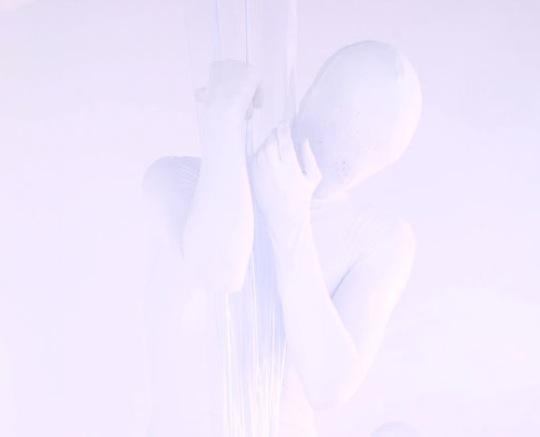Open from 7 November
Private view Thursday, 8 December, 6-8pm
Waterside contemporary is pleased to present Possible outcomes, with Oreet Ashery, Iván Argote, Nick Hornby, Núria Güell, Nicoline van Harskamp and Marianna Christofides.
Oreet Ashery's video series Revisiting Genesis explores the implications of the processes surrounding death and withdrawal, digital afterlives, social networks, and outsider communities. The films follow two nurses who assist people preparing for death in creating their posthumous digital legacy. The slideshows they create become a tool for reflection on cultural and social loss, friendships and memory as identity.
Unorthodox, multi-layered and eclectic, Ashery’s expansive body of work confronts ideological, social and gender constructions within the fabric of personal and broader contemporary realities. Ashery mines counter-culture aesthetics and traverses photography, video, mass-produced and unique artefacts, text, commissioned music, and performance.
To tell the History of Humanity, Iván Argote invited members of his family to collaborate on a script for a Super 8mm home film. They proposed that History consists of eight chapters, among them ‘The Emergence of Homo Sapiens’, ‘Love and Hate’, ‘Colonization and Post-Colonization’, and ‘Uncertain Future’, which the as actors they allegorise through games and gestures in a public park.
Spanning film, sculpture, and public action, Argote’s work encounters evolving social attitudes and norms as societies face daily challenges in historical, economic, political and moral realities. Making recourse to the history of his native Colombia and his own family, with disobedience a part of everyday culture, Argote links our contemporary realities with those of earlier generations. Argote is a proponent of the communicative role of artistic practice, and with irreverent humour and tactility, he exposes the subjectivity of prevailing norms, and creates the space for emotive and bodily participation in the way these are shaped.
Nick Hornby’s Masks point to a fabled meeting of 1907 between Matisse and Picasso in which a collection of African masks inspired the invention of Cubism only weeks later. This story encapsulates the familiar grand narratives of art history: the myth of genius, inspiration, otherness, but also reflects on the necessary subtleties and gaps between them. Hornby replicates these broad strokes with precision and control: starting with a Matisse gouache, he manipulates the inherited form to arrive at a plausible back-story.
Hornby’s work is the physical meeting of historical critique and digital technology; behind hand-crafted sculptures of marble, resin or bronze are computer-generated models, expanding shapes, silhouettes and shadows into manifest examples of the collusion between disparate ideas.
With Good Intentions, Núria Güel and Levi Orta started acquiring historical artefacts from areas affected by war and conflict, undertaking to care for and preserve them until they can be safely returned to their place of origin. This operation – funded by donations - both mirrors and contradicts collecting narratives of great institutions of Western civilisation.
Güell’s practice exploits established systems of power and their effects on everyday realities. Her work, often originating from a personal or corporate action, materialises where subjectivity is artificially limited by institutions such as governments, and where moral and legal realms are not in alignment.
Nicoline van Harskamp uses varieties of internationally-spoken English to propose a future shaped by the ubiquity and constant evolution of the language, and its inevitable divergence from hegemonic norms. Portrait of an Englishes Collector sees a fictional amateur linguist conduct a methodical, though scientifically frivolous study of the lingua franca spoken in remote parts of the world. Through a series of fractured
Possible Outcomes
Waterside Contemporary, 2 Clunbury Street, London

Ad
Event has ended
This event ended on Wednesday 14th of December 2016
This event ended on Wednesday 14th of December 2016
Admission
Free
Free
Tags:
Art
User Reviews
There are no user reviews
